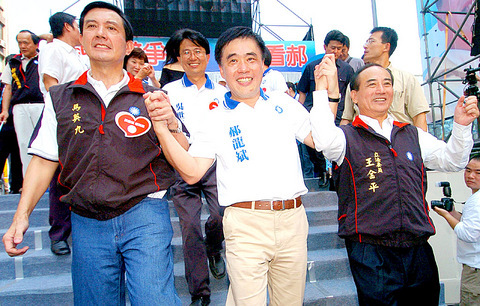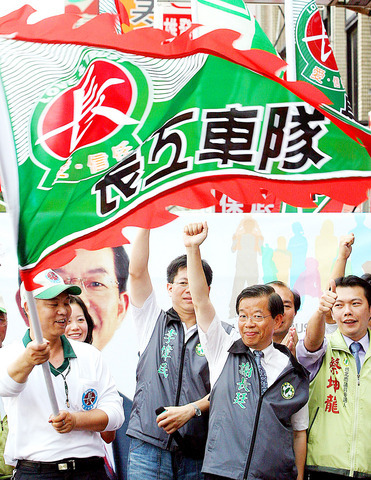Since People First Party (PFP) Chairman James Soong (
To avoid a split vote, the Chinese Nationalist Party (KMT) is trying to shore up support for its candidate, while the Democratic Progressive Party (DPP) is seeking to exploit the rift between the KMT and its erstwhile ally.
KMT heavyweights yesterday rallied to win broad pan-blue support for their Taipei mayoral candidate Hau Lung-bin (

PHOTO: WANG MIN-WEI, TAIPEI TIMES
Led by party Chairman Ma Ying-jeou (
"With three mayoral candidates from the pan-blue camp, more than 70 percent of pan-blue voters said they feel a sense of crisis. If you agree with them, please gather up your votes and support Hau Lung-bin," Ma said, addressing the launch ceremony in front of the campaign headquarters.
He urged pan-blue voters to "teach [President Chen Shui-bian (

PHOTO: WANG YI-SUNG, TAIPEI TIMES
"If the DPP lost the Taipei and Kaohsiung mayoral elections, Chen would realize the power of public opinion," he added.
Wang, who showed up at Soong's (宋楚瑜) book-launch party when Soong declared his mayoral candidacy, yesterday stressed that the Taipei mayoral election -- as much as the 2008 presidential election -- required the KMT and the PFP to combine their efforts to win.
"History serves as a mirror for us ? Do we really want to repeat our failures? The KMT and the PFP should share the responsibility to find a smooth path for the pan-blue camp in the elections," Wang told the press before addressing the ceremony.
Wang made the comments to remind supporters not to repeat the result of the 1994 Taipei mayoral election, when two pan-blue candidates split the ticket and gave Chen a surprise victory.
In response to comments made by some party legislators that Ma should take full responsibility and resign if the KMT loses the year-end elections, Wang said the party should focus its efforts on electing Hau, rather than discussing such a "meaningless" issue.
While Ma had said that he would not allow the KMT to lose the Taipei and Kaohsiung mayoral elections, Hau yesterday said he will shoulder all responsibility if he loses the election.
Promising to clean up the Tamsui River (
"I don't know who Hsieh is competing with, me or my father," he said.
KMT Legislator Wu Den-yih (吳敦義), a former Kaohsiung mayor who lost the 1998 Kaohsiung mayoral election to Hsieh, also joined Hau to attack Hsieh for conducting a smear campaign, urging voters to support Hau.
With chances of dissuading Soong from joining the election fading, the KMT has placed its hopes on the so-called "dump-save effect" by raising the sense of crisis among pan-blue voters and urging them to dump Soong and vote for Hau in the election.
Soong, on the other hand, urged the KMT to place Taipei residents' concerns first, rather than considering only the political issues in the campaign.
"The KMT should find the best candidate to compete with Frank Hsieh. Can a former minister of the Environmental Protection Administration compare with a former premier?," he said yesterday.
Claiming that there is still room for KMT-PFP negotiations in the election, Soong said he is willing to debate municipal policies with Hau.
Meanwhile, DPP lawmakers yesterday asked Hau to withdraw from the election over telling lies to cover his and his father's wrongdoings.
Hau has been under fire over corruption allegations, while DPP lawmakers charge that his father was illegally occupying a public dormitory and had used public money to pay his telephone, water and electrical bills for more than 10 years.
At one time, retired premiers were allowed to apply for subsidies for their utility bills, but the privilege was canceled last month due to the lack of a legal basis.
Rebutting the allegations, Hau Lung-bin said that the dormitory, allotted to his father when he served as minister of national defense, was returned to the ministry in June and that he has paid his water and electric bills since.
However, DPP legislators Kuan Bi-ling (
"According to the Ministry of National Defense's documentation, Hau Pei-tsun returned the key of the dormitory on Oct. 6, the day we disclosed his occupation of the house, not in June," Hsu said.
Regarding the bills, Kuan said Hau Lung-bin has been using "No. 315 Fulin Road" as his mailing address for more than 20 years and the water and electric bills for the house have been paid for with government money.
Hau Lung-bin reiterated yesterday that his father has been paying the water and electric bills and urged the DPP not to spread rumors to win elections.
He said that the preferential treatment his father had previously received was in accordance with the regulations and had been approved by the DPP government, "including former premier Frank Hsieh" (
Hsieh challenged Hau Lung-bin to make public the receipts for his father's utility bills.
DPP Chairman Yu Shyi-kun and Hsieh also questioned the KMT campaign's honesty.
Yu said in a campaign event yesterday that although Tang Fei (唐飛), Chang Chun-hsiung (張俊雄), Frank Hsieh (謝長廷) and he were entitled, as former premiers, to government benefits such as drivers and utility discounts, none of them actually took advantage of the privilege as Hau Pei-tsun did.
"This is a KMT privilege," the DPP chairman said. "It seems that the DPP is cleaner than the KMT [in this regard]."
Hsieh mentioned in another event that when he was running for Kaohsiung mayor in 2002, his KMT rival spent more than 90 percent of the mayoral special allowance on rewarding campaign staff without requesting any receipts from campaign members.
Hsieh also said he chose not to enjoy government advantages as a former premier in order to "contribute to public welfare."

SECURITY: As China is ‘reshaping’ Hong Kong’s population, Taiwan must raise the eligibility threshold for applications from Hong Kongers, Chiu Chui-cheng said When Hong Kong and Macau citizens apply for residency in Taiwan, it would be under a new category that includes a “national security observation period,” Mainland Affairs Council (MAC) Minister Chiu Chui-cheng (邱垂正) said yesterday. President William Lai (賴清德) on March 13 announced 17 strategies to counter China’s aggression toward Taiwan, including incorporating national security considerations into the review process for residency applications from Hong Kong and Macau citizens. The situation in Hong Kong is constantly changing, Chiu said to media yesterday on the sidelines of the Taipei Technology Run hosted by the Taipei Neihu Technology Park Development Association. With

CARROT AND STICK: While unrelenting in its military threats, China attracted nearly 40,000 Taiwanese to over 400 business events last year Nearly 40,000 Taiwanese last year joined industry events in China, such as conferences and trade fairs, supported by the Chinese government, a study showed yesterday, as Beijing ramps up a charm offensive toward Taipei alongside military pressure. China has long taken a carrot-and-stick approach to Taiwan, threatening it with the prospect of military action while reaching out to those it believes are amenable to Beijing’s point of view. Taiwanese security officials are wary of what they see as Beijing’s influence campaigns to sway public opinion after Taipei and Beijing gradually resumed travel links halted by the COVID-19 pandemic, but the scale of

A US Marine Corps regiment equipped with Naval Strike Missiles (NSM) is set to participate in the upcoming Balikatan 25 exercise in the Luzon Strait, marking the system’s first-ever deployment in the Philippines. US and Philippine officials have separately confirmed that the Navy Marine Expeditionary Ship Interdiction System (NMESIS) — the mobile launch platform for the Naval Strike Missile — would take part in the joint exercise. The missiles are being deployed to “a strategic first island chain chokepoint” in the waters between Taiwan proper and the Philippines, US-based Naval News reported. “The Luzon Strait and Bashi Channel represent a critical access

Pope Francis is be laid to rest on Saturday after lying in state for three days in St Peter’s Basilica, where the faithful are expected to flock to pay their respects to history’s first Latin American pontiff. The cardinals met yesterday in the Vatican’s synod hall to chart the next steps before a conclave begins to choose Francis’ successor, as condolences poured in from around the world. According to current norms, the conclave must begin between May 5 and 10. The cardinals set the funeral for Saturday at 10am in St Peter’s Square, to be celebrated by the dean of the College